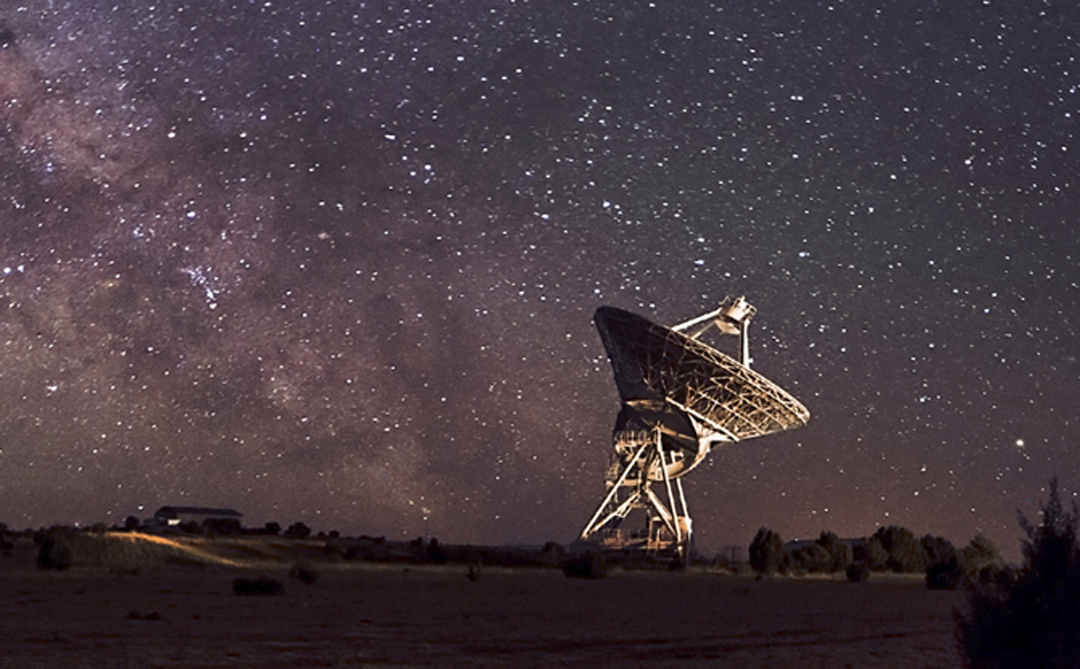By Chris Lee
As an avid fan of the public radio show This American Life (TAL) hosted by Ira Glass, I wait eagerly each week for the newest podcast to drop. I recently listened to the May 19, 2017 episode, “Fermi’s Paradox”. The TAL website provides the following description,
“Three people grapple with the question, ‘Are we alone?’ … If there is intelligent life elsewhere in the universe, why haven’t we heard from the extraterrestrials yet? Producer David Kestenbaum explains The Fermi Paradox to host Ira Glass. The possibility that we are alone in the universe makes David sad.”
Physicist Enrico Fermi questioned why, if there is a high probability of intelligent life being out there somewhere, is there such a dearth of evidence for it. The lack of evidence suggests that perhaps the probability of intelligent life existing may not be high after all. Perhaps intelligent life is rare or even unique to earth. This possibility, then, raises the specter of an empty universe.
To say this thought makes TAL producer Kestenbaum “sad” is an understatement. It would be more accurate to describe his dismay as a state of obsessive depression. Imagine the existence of humanity being nothing more that a random quirk, a highly improbable product of time plus chance in an evolutionary lottery never to be repeated. We live, we die, and are utterly alone in an incredibly vast expanse of meaningless empty space.
What is real?
I’ve known a few former Adventists who were so disillusioned in discovering the lies of Adventism that they gave up on all belief and became agnostic or atheist. I find it incredibly sad to see people joining the ranks of the hopeless masses, believing there is no meaning and nothing else out there. Of course, if that’s what actually corresponds to reality, then we should embrace it and learn to deal with reality, no matter how depressing. But is it true? Just because Adventism was false, it doesn’t mean there is no creator or meaning to the universe. In fact, I believe there are valid intellectual reasons to believe that we are not alone. I’m not arguing for the existence of space aliens, but for the existence of an intelligent, personal, relational Creator who gives meaning to the universe and to our existence.
Fermi’s Paradox is only a paradox if you believe that God is not necessary in order to account for the creation of the universe. If the vast universe with its many planets came about through chance and humans formed on this particular planet by chance, then it would seem to stand to reason that there is a high probability of other intelligent life forming in the same way. But, since there is no good evidence of this actually being the case, we have a paradox. If, on the other hand, we admit that humanity is nearly impossible to explain by pure chance, then we are in the position of having to posit some extraordinary force. Many people are incredibly reluctant even to consider the possibility because such a conclusion has overtones of something they reject: faith. However, I would argue that it takes an even bigger leap of faith to reach the conclusion that the universe can be accounted for otherwise.
Noted theoretical physicist and cosmologist Steven Hawking provides an example of the type of faith required to dismiss the possibility of a creator. In his book The Grand Design, Hawking appeals to gravitation as a sufficient force for creation. While his conclusion is tied to complex string theory, it seems to lead to other problems on a more basic level. Hawking is placing a good deal of faith in something that is, as of yet, not fully explained by anyone, including himself. It has been demonstrated that Newtonian physics alone cannot explain gravity. Most theories today use principles of general relativity to explain gravitation. In these models space-time is curved by matter, an explanation which helps to explain the attraction between objects of mass. However, general relativity does not play nicely with the growing science of quantum mechanics where the force of gravity must be explained quite differently. In quantum mechanics, gravity is related to the attraction and exchange of virtual gravitons. At this point, no one can truly tie Newtonian physics, general relativity, and quantum theories of gravity together.
If I understand Hawking’s approach, he is proposing string theory as a possible future unifying solution, but it appears that string theory is really being used as a Trojan horse to sneak in the concept of nearly infinite parallel universes. This construct is necessary in order to explain the mind blowing degree of fine tuning observed in this particular universe. If there are nearly infinite universes, then surely one is highly fine-tuned for life. Never mind that this idea owes more to sci-fi then it does to actual hard evidence. These are all fascinating theories, but when it comes right down to it, we’re still no closer to really understanding why gravity actually exists as opposed to nothing existing at all. Basically, we can describe the effects and facts of gravity, but we cannot truly define a root cause for gravity that would bind all the various observations and theories together in a coherent way. In short, Hawking is appealing to an incredibly complex force he does not fully understand and cannot completely explain, and yet he has great faith that this force is sufficient to rule out God’s involvement. To depend on this unexplained force as the sole “creator” and shaper of the universe seems like a leap of faith to me.
What was the beginning?
Hawking has an even larger problem than this. All of the most accepted cosmological models point back to a point when time-space (as well as matter, energy, and gravity) must have first come into being. Hawking says that God was not necessary to spark the existence of something from nothing, but he does not adequately explain just what could produce existence out of non-existence other than simply resorting to his nearly-infinite universes theory.
Suggesting more than one universe, even universes nearing infinity, however, brings us no closer to an original cause. Whatever the cause, it would have to be independent of time-space, matter, energy, and gravity. Or, to put it another way, the cause would have to pre-exist time-space, matter, energy, and gravity. The cause would also have to be greater than or equal to the effect, i.e. the cause would have to be greater than or equal to the observable time-space universe and all forces within it. We should also point out that we cannot logically have an infinite regression of causes, so at some point there must be an uncaused first cause which meets these criteria.
Hawking doesn’t explain what this “uncaused cause” might be. There is no point in appealing to gravity if one can’t explain gravity, its cause, or why it exists as opposed to nothing existing. Hawking wants to tie the various theories of gravity together, which of necessity must involve matter, but we’re still left with the problem of matter coming from nothing. Whether we focus on gravity, matter, or both, we still have to deal with an uncaused first cause.
Hawking mixes his faith in the ability of science to eventually explain everything into his reasoning and conclusions. We too take some things on faith, but that does not mean that Christianity is incompatible with reason. Rather, we believe that Christianity corresponds to reality. If that’s true, then Christianity is reasonable and can stand up to scrutiny. Belief is not dependent on blind leaps of faith, but on faith grounded in evidence. Each of us needs to grapple with the question of origins and decide whether gravity alone is a sufficient explanation for why there is something rather than nothing, or if logically there must be an uncaused first cause. In his book Hawking hails the death philosophy. Let us hope that in saying philosophy is dead, he is not also abandoning the underlying logic required to reach reasonable conclusions.
All this is to say, it takes faith to believe there is no God. Those of us involved in apologetic endeavors should be prepared to reason with those who have real questions about origins. We, unfortunately, have sometimes projected an almost anti-intellectual image of the Church, as if faith and reason are not compatible or reason somehow is antithetical to faith. There is no dichotomy here. I think this fact is extremely important for former Adventists to understand. Just because Adventism was built on faulty logic and couldn’t withstand scrutiny, it doesn’t mean all matters of faith have no basis in reality or logic. Just because we left Adventism, we don’t have to leave our faith in God as creator. If there really is an uncaused first caused capable of fine tuning this universe for life, then such an idea is not only worthy of intellectual consideration, it will withstand intellectual scrutiny.
Fermi’s paradox suggests the possibility we may be alone. Hawking’s view implies, whether or not we are alone in the universe, it’s all without any particular meaning or purpose. The Bible explicitly provides meaning, purpose, and the assurance that we are not alone. Before discarding such a hopeful view of the universe, it’s worth questioning which world view requires the greatest leap of faith.
SUPPORT PROCLAMATION!
- 3. The Trinity - August 1, 2024
- 2. The Holy Spirit Is a Person - July 25, 2024
- 1. God Is One - July 18, 2024


After posting this piece I ran across this article:
https://www.theverge.com/platform/amp/2017/6/1/15720814/nasa-curiosity-rover-mars-petrified-mud-lake-gale-crater-habitable-microbial-life
The article is indicative of the reason Fermi perceived a paradox. Basically, there is an almost unchallenged assumption that where liquid water and a suitable chemical environment exist, life will exist (or at least life is likely to exist). That seems like a huge assumption to me.